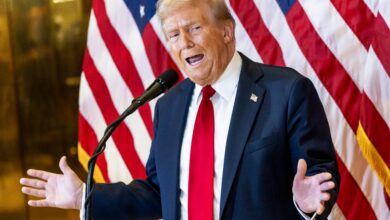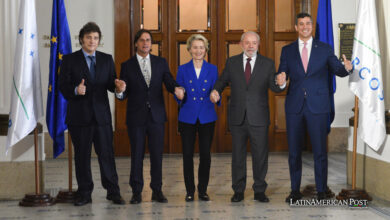EU Envoy Urges Human Rights Improvements in Cuba Amidst Sanctions
In a recent diplomatic engagement, a European Union (EU) envoy has expressed apprehensions that the sanctions imposed by the United States are exacerbating the human rights situation in Cuba.

11/24/2023.- General view of the fourth EU-Cuba Human Rights Dialogue in Havana (Cuba). EFE/ Ernesto Mastrascusa
The Latin American Post Staff
Escucha este artículo
Leer en español: Enviado de la UE insta a mejorar los derechos humanos en Cuba en medio de sanciones
EU's human rights envoy, Eamon Gilmore, reiterated the EU's call for the Cuban government to release detainees from the mass protests that took place in July 2021. During two days of discussions with top officials in Havana, Gilmore addressed a spectrum of rights issues, including freedom of expression, assembly, gender equality, and socio-economic rights.
Gilmore emphasized that U.S. sanctions on Cuba, which significantly restrict financial transactions, tourism, and trade, have clear repercussions on the Cuban economy and society. He pointed out that the primary impact of these sanctions is on ordinary Cuban citizens, who face challenges in accessing essential resources such as food and medicines. In contrast, the EU's approach to sanctions is targeted at individuals and entities responsible for human rights violations, rather than imposing broad restrictions on the population.
U.S. Justifications for Sanctions and Exceptions for Humanitarian Purposes
While the U.S. argues that these sanctions are necessary to hold the Cuban government accountable for rights violations, they claim to make exceptions for humanitarian purposes and programs designed to support the Cuban people and the private sector.
Gilmore acknowledged that Cuba has made some progress in the realm of women's rights and gender equality. However, he reiterated the EU's previous criticisms of Cuba's handling of the 2021 protests, which were the largest demonstrations since the 1959 Revolution led by former leader Fidel Castro.
Both the United States and the European Union have criticized Cuba's response to these protests as repressive and heavy-handed. Human rights organizations estimate that around 1,000 Cubans were detained for their political beliefs following the demonstrations, with subsequent protests also leading to arrests.
Regarding discussions about potential prisoner amnesty, Gilmore declined to provide specifics but emphasized that the European Union has long-standing demands for the release of detainees. Cuba maintains that it does not hold political prisoners and asserts that those detained are guilty of crimes such as assault, vandalism, and sedition.
Tensions surrounding this issue escalated just before Gilmore's visit, following the death of a detainee in Cuba this week. The U.S. embassy expressed outrage over the detainee's death, prompting further scrutiny.
Gilmore's Engagements and Cuban Official's Response
During his visit to Cuba, Gilmore engaged with a wide range of individuals, from President Miguel Diaz-Canel to the families of detained protesters. He noted that Cuban officials had shared some details regarding the recent case, highlighting that an investigation is underway, and results will be available in due course.
Also read: Cuba's Unfolding Economic Crisis Leads to Essential Shortages
This visit to Cuba, which concluded with a formal dialogue on human rights with top Cuban officials, is a stipulation of a 2016 political and cooperation agreement between the EU and Cuba. Gilmore described the EU's relationship with Cuba as "constructive but critical," underscoring the importance of addressing human rights concerns in the region.




